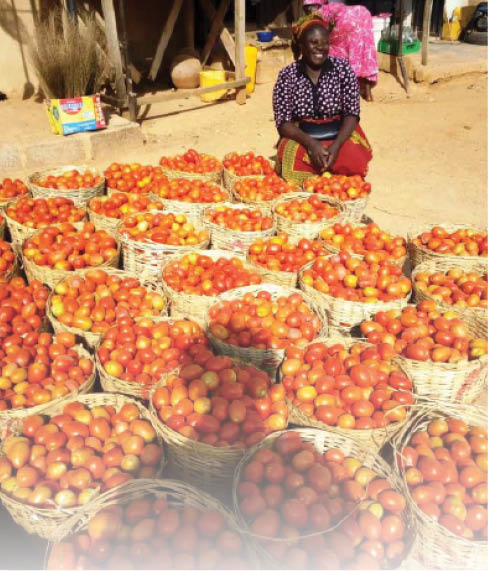Tomato farmers lament pest invasion
Tomato farmers in Jos, the Plateau State capital, have been lamenting over pest invasion

Mama Agwom at the Jarawa tomatoes market in Jos
Tomato farmers in Jos, the Plateau State capital, have been lamenting over pest invasion, saying it has caused them a lot of loss in recent times.
They also grieve over the lack of adequate pest control facilities, which they said had made pests to regularly attack their tomatoes.
- Why Nigeria’s ginger output is low
- 3 Killed, 2 injured as Amotekun operatives, herdsmen clash in Oyo State
One of the farmers at the Lamingo area of Jos, Marcel Ndubuisi, said he spent most part of last year battling with the pests on his farm.
He also said the activities of middlemen and the high cost of fertilizer was making the business very challenging.
He urged government to intervene and support them in tackling their challenges.
The woman leader in the tomato market at the Cele-bridge area of Jos, Ruth Izang, said the pest invasion had seriously affected the quality of tomatoes harvested.
She said whenever the pest attacked the crop it became easily perishable.
She added that the farmers always struggle to purchase the chemicals to control the pests for their farms.
Izang said because the crop is naturally perishable, it is imperative to do anything possible to protect it against anything that would expedite its damage and subsequent loss.
Meanwhile, in a bid to boost tomato and ginger production and value chain development in Plateau State and address the challenges in their production generally, stakeholders converged on Jos to brainstorm on the way forward.
Suggestions for improvement were the focal point of the two-day workshop.
The programme, titled Policy Engagement and Dialogue with Tomato/Ginger Associations/Groups in Plateau State, was organised by the Nigeria Competitiveness Project (NICOP), co-funded by the German government and the European Union and implemented by GIZ and the Federal Ministry of Industry, Trade and Investment.
The NICOP is supporting the development of tomato and ginger value chain in Plateau State, and as part of the support, it organised a policy dialogue with tomato and ginger farmers alike, growers, marketers associations, processors and the Plateau Agriculture Development Programme (PADP) to develop a roadmap (concrete strategy) to address specific business enabling environment constraints for micro, small and medium enterprises in the tomato and ginger sector in the state.
Stakeholders at the event agreed that improving the business environment by lifting constraints and filling gaps in the regulatory and administrative support mechanisms at national, state and local levels is central to any comprehensive competitiveness strategy for the tomato/ginger value chain.
Farmers and tomato/ginger associations came from 10 local government areas of the state: Shendam, Wase, Pankshin, Kanam, Mangu, Barki Ladi, Riyom, Jos South, Jos East, and Bassa.
At the dialogue, participants developed priority areas for further engagement with government and other stakeholders.
The NICOP assured the groups of their continuous support as a partner committed to the development of tomato/ginger in the state.
In his remarks at the event, the facilitator and presenter, Akin Umoare, said beside tomato and ginger, the NICOP was supporting other crops across the country and beyond, adding that the general concept is to promote non-oil sector, particularly agriculture.
He noted that value chain development of crops under discourse would go a long way in boosting the nation’s economy and foreign earnings; that is the agricultural value chain development, beginning from the farm to transporters from the farm before getting to the point of export.
Umoare explained that adding value to the crops implied that everything should be qualitative and standardised from the seedlings, planting, nurturing, harvesting, transportation/exporting.
He called on the stakeholders and government to join hands in developing the agriculture, tomato, ginger values chain as it would create jobs and enhance youth empowerment.
In his remarks, the chairman of tomatoes and vegetables farmers association of Kanam Local Government Area, Subinma Ramanu Biwar, said there was a need to empower agricultural extension workers in different communities/localities, who should in turn give the stakeholders technical advice and supervise their farms and value chain, where necessary.
He also lamented the lack of good access roads between the farms and markets, lack of fertilizers to grow the crops, as well as a good synergy among the farmers.
Similarly, the secretary of tomatoes farmers in Barkin Ladi Local Government Area, Auwal Tanko Haruna, said although government had been assisting the farmers with fertilizers, tractors, provision of irrigation dams and regular training and retraining of farmers, more still need to be done.
